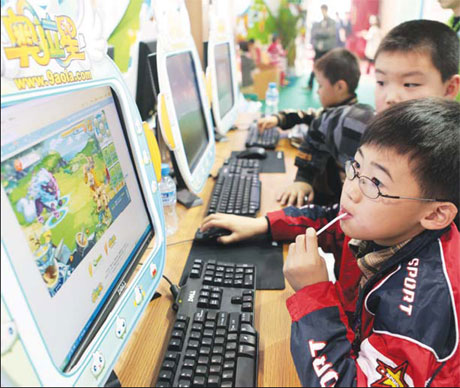Online gaming giants target China
Updated: 2010-12-24 11:02
By Eric Jou (China Daily European Weekly)
Micro transactions, prominently featured in social network software games such as Farmville and Happy Farm, is a symbol of how ahead China is compared to the West in online gaming, analysts say.
"China is evolving the online gaming market better than any other country in the world," Tsao says. "The West is slowly catching up to the concept of online gaming in general. China has close to a decade more of experience."
Another technological improvement that is growing the video gaming industry is the advent of the Apple App store and the proliferation of smart phones, analysts say.
With the mobile phone gaming market expected to generate half a billion euros this year and close to 1.1 billion euros in the next five years, China is also becoming the home of hundreds of independent game developers working for the mobile market.
|
|
 |
This kind of mobile Internet distribution system bypasses the problem of the online operators in China and is proving to be a new form of distribution, resulting in an increase in the number of smaller foreign companies coming to China to create games.
Smaller developers and companies that may not possess the investment capital of big companies also head into China making games with cheap talent and using the new distribution channel created by the iPhone to sell their games back to the West.
Happy Latte is one of such company that operates in China but focuses and sells its products in the West.
"Honestly, we don't even target China as a market, our games were not even available at the beginning in China," says Bjorn Stabell, managing director of Happy Latte.
"We were doing something for RenRen (Chinese social networking service) but we found it not as open as Facebook and the Apple App store."
Despite the seemingly closed market, it all comes down to the possibilities that the Chinese market and industry holds.
Patrik Wilkens, vice-president of sales of Shouji Mobile, a British-owned based in Beijing that deals in localization for foreign companies, sees a bright future for the game industry in China, particularly the mobile market. He cited the prospective plans of companies like Rovio, PopCap and Electronic Arts.
"First of all, the Chinese market is so big, it's very difficult to ignore it. On the mobile side, it's harder to access the Chinese market than to enter the European market," Wilkens says. "But I think the Chinese market, especially with the Android technology on the smart phone side, will grow even bigger. Android is getting cheaper and more affordable and with the whole market shifting right now to smart phones, I'm sure that companies like big ones are coming here. Rovio mobile is coming into the market, Popcap is already in the market and EA is setting up it's own studios in the market."
The increase in the number of Chinese and overseas developers making games in the country also presented opportunities for UBM, which operates the Game Developers Conference (GDC) to set up GDC Shanghai for game makers to get together and trade stories, techniques and lessons on how to make great games.
"What we're hoping for is that everything that UBM can offer regarding game making can be made available for the Chinese market," Zhang Ming from UBM China says.
"The products we can offer to the Chinese developer are very much Chinese oriented."
"Chinese game companies have built strong domestic franchises in the online and mobile game markets and believe that long-term consolidation in the games market will come from China," Merel says.
"Building on their strength in high-growth online and mobile games, Chinese companies may come to dominate the global video games market."
Paper's Digest

Shaolin Kungfu
Shaolin Temple charts aggressive expansion plan to cash in on demand for kungfu.
Living 'IT' up
Father of pinyin
Touch and go
Specials

China Daily in Europe
China Daily launched its European weekly on December 3, 2010.

Hu visits the US
President Hu Jintao is on a state visit to the US from Jan 18 to 21.

Private Detective
Firms chart new strategies as tighter rules make information gathering tougher.

